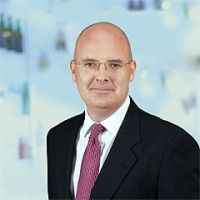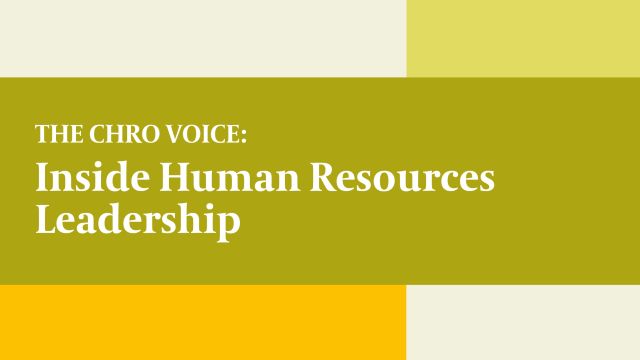The role of HR has become more complex, sophisticated, and nuanced. Issues like diversity and inclusion are now at the forefront, and activist investors are pushing for changes in compensation structures and policies. This is a true test of the courage of conviction.
 Michael O’Hareformer CHRO of The Estée Lauder Companies
Michael O’Hareformer CHRO of The Estée Lauder Companies
Human Resources is, at its core, about people—but that foundation can get lost amid the intense demands of administration and strategy upon leaders as they navigate complex, high-stakes work.
Human Resources is, at its core, about people—but that foundation can get lost amid the intense demands of administration and strategy upon leaders as they navigate complex, high-stakes work.
Having served as Chief Human Resources Officer for 17 years across Asia, Europe and the United States—including most recently at The Estée Lauder Companies—Michael O’Hare is a firm believer that the true mission of HR lies in its purpose. We sat down with O’Hare to explore how the role is evolving, how purpose can shape it, and where it’s headed next.
The CHRO role is often described as the second loneliest role in the suite. Do you agree with that description?
The CHRO role is often described as the second loneliest role in the suite. Do you agree with that description?
The CEO's job is lonely, but I would say the CHRO role is probably the most isolated. And I think that's because, in your job, you have a responsibility to the CEO, the executive team, and the board. You're the person that handles restructuring, promotions, and movements. You have to be an independent voice as it relates to the CEO.
You're the individual who goes into the room, shuts the door, and has the tough conversations with the CEO, the chair, and various board members. You can't be overly biased; you have to understand your true north and maintain distance to have the objectivity to make calls on people, including yourself. These are all super hard conversations. You're the head of the Ethics Committee, and you assess various things. You take solace from your team, but the job is isolating, powerful, and impactful. You're usually the first and last person through the door on a series of difficult conversations, from CEO succession to compensation discussions.
You're usually the first and last person through the door on a series of difficult conversations, from CEO succession to compensation discussions.
 Michael O’HareFormer CHRO of The Estée Lauder Companies
Michael O’HareFormer CHRO of The Estée Lauder Companies
How have you balanced the multifaceted demands upon the role—leading the HR function, navigating the leadership team, driving business strategy—throughout your career?
How have you balanced the multifaceted demands upon the role—leading the HR function, navigating the leadership team, driving business strategy—throughout your career?
You have to be able to look at yourself in the mirror. What has always held me in good stead is understanding my true north and why I'm doing certain things. For me, it was always about what was in the best interests of the organization and the employees. All others were oriented toward the broader collective good. Navigating the various stakeholders—shareholders, whether family members, board members, CEO, or executive team and their interests—is really hard, especially in family-run publicly traded companies where the family is still present in the business.
Sometimes, the collective good can be a bit more altruistic. For example, the overturning of Roe v. Wade led our company, which is 82% female, to ensure our benefits include the coverage of costs associated with a wide range of reproductive healthcare benefits that align with our employees’ personal choices. While this was a political decision that was made in the U.S., ensuring our existing reproductive healthcare services remain equitable and available to eligible employees was important to our company, just like being progressive on maternity and paternity leave. These decisions can mean a financial cost, but they are in the best interest of our employees and align to the values of the company.
You've been a CHRO for 17 years and at the helm of large publicly traded companies. How have you experienced the role evolving in that time?
You've been a CHRO for 17 years and at the helm of large publicly traded companies. How have you experienced the role evolving in that time?
I’ve been a CHRO in both Europe and the United States. Historically, the role of HR in Europe has been different from that in the U.S. In the U.S., you have more agency, whereas in Europe, you must navigate societal and social norms more extensively. For example, I once had to manage a works council with 70 people in a room, meeting quarterly with multiple translators. In Europe, you move as a collective rather than as an individual. There is a greater emphasis on social responsibility, fair pay, and CEO issues, while the U.S. leans more toward capitalism.
Both regions experienced a significant pivot during COVID-19, where many CFOs and CHROs lost their jobs due to their inability to navigate the political landscape effectively. The collaboration between the CFO, CEO, and CHRO became even more crucial. During the pandemic, we faced tough decisions such as shutting stores, continuing to pay employees, managing cash flow, cutting dividends, and changing compensation structures. We also dealt with crises like the Russia-Ukraine conflict, cybersecurity attacks, natural disasters, and the shift from in-store to online channels. Everything was pressure-tested. My CFO and I had over 50 years of combined experience in the C-Suite, which gave us the judgment and trust needed to navigate these issues.
The role of HR has become more complex, sophisticated, and nuanced. Issues like diversity and inclusion are now at the forefront, and activist investors are pushing for changes in compensation structures and policies. This is a true test of the courage of conviction.
This is a true test of the courage of conviction.
 Michael O’HareFormer CHRO of The Estée Lauder Companies
Michael O’HareFormer CHRO of The Estée Lauder Companies
What traits and leadership qualities should CHROs today and in the future bring, and how can up-and-coming HR leaders build those capabilities?
What traits and leadership qualities should CHROs today and in the future bring, and how can up-and-coming HR leaders build those capabilities?
HR leaders have to be brave—which is easy to say, but hard to do. They need to have the courage of their convictions and a strong moral code and spine as it relates to what they think is important, whether it's bringing people in, letting people go, or making changes in benefits. I've had disappointing conversations with CHROs who just want to make issues go away because their CEO wants it. Disenfranchised or underserved communities will remember these actions. Leadership and independence of voice are important. Knowing and understanding your business in-depth is crucial to help your CEO and senior team. Many senior HR people still don't fully understand how their business operates, including many HR business partners.
As you think about the impact you had at The Estée Lauder Companies, where do you think you left your fingerprints on that organization?
As you think about the impact you had at The Estée Lauder Companies, where do you think you left your fingerprints on that organization?
I've had seven or eight of my team members go on to be CHROs in other companies, which I'm proud of. The function became stronger, and my relationship with the CEO helped. We became more analytical and progressive on benefits. We created a lot of wealth for employees, and our engagement scores were always in the mid-80s. I took the function from a three to a six, and hopefully, Michael (Bowes, newly appointed CHRO) will take it to a seven or eight. He has a new team and a different point of view. I try not to be overly focused on what I did; I managed the team and together, we moved the needle forward.
What do you think the opportunities and challenges ahead are for HR professionals?
What do you think the opportunities and challenges ahead are for HR professionals?
The fast pace of technology is a big deal for HR professionals. Companies can't keep doing huge SAP upgrades, so they need to stay on top of new tech in smarter ways. While tech and analytics give HR more data and dashboards, it can sometimes make them react instead of planning strategically. HR really needs to own areas like organizational design and effectiveness, and that means understanding the whole business, from the operating model to the specific roles like supply chain planners and FP&A. It seems really obvious, right? But understanding the business they're in is crucial.
Financial and business acumen are going to be big things. HR needs to get good at financial and business topics to handle the speed and changes in today's business world. They should know what different jobs in the company do to make better decisions about redesigns and forecasting. For example, understanding what a supply chain planner does versus an FP&A person can help HR make better decisions about staffing and resources. If they get it wrong, it could lead to issues like working capital problems and write-offs.
What is your purpose?
What is your purpose?
This job, more than any other, has the ability to shape and change for the positive how people interact in work and at home, whether it's through benefits, online repayment programs, or compensation. You control all the levers.
HR people sometimes forget about the real purpose of their jobs: to make the lives of the people who work in the organizations better. That might mean, you don't go into high-deductible health plans, or ensuring employees have a balance in their professional and personal lives, to spend time with their kids and their aging parents or their loved ones.
I am not a manager for every single person, but many of the environmental variables surrounding their experience are in my control. So, what greater purpose could you ask for? What an awesome responsibility and experience.
What greater purpose could you ask for?
 Michael O'HareFormer CHRO of The Estée Lauder Companies
Michael O'HareFormer CHRO of The Estée Lauder Companies







